![]()
1
Toward Retrieving the True Legacy of Dietrich Bonhoeffer
Introduction
If one asks the average English-speaking Christian what she or he knows about Dietrich Bonhoeffer, it is quite predictable that what will be named is that he was executed for his involvement in attempts to kill Hitler. If this individual knows a bit more about Bonhoeffer, such a person might offer some version of the alluring words on the cover of the New York Times bestselling biography of Dietrich Bonhoeffer by Eric Metaxas:
The biography by Metaxas may not be well respected in the academy, but I think this quote in fact reflects what are generally believed to be the two best known—and thereby, centrally defining—facts about Bonhoeffer. First, he was executed for being involved in attempts to kill Hitler. Second, he was the author of two widely read books. One of them—Nachfolge, now translated simply as Discipleship—seems to suggest that in the mid-1930s he sounded like a pacifist. Therefore, it follows that his later involvement in attempts to kill Hitler either reveals that he was never really a pacifist or shows that he underwent a shift in his ethics and had, by the beginning of the 1940s, embraced a realism similar to that of his former teacher Reinhold Niebuhr. For he realized that when you are confronted by the horrendous realities of a violent and cruel Nazi regime—especially the murder of millions of Jews—you are morally compelled to become a realist, willing to employ violence to stop those who perpetrate such gross injustices. In fact, precisely because of this shift in ethics, he is often seen as one of the most powerful exemplars of the Niebuhrian realist approach.
But what if there is no evidence that he was executed for his part in the plot to assassinate Hitler? What if, instead, there is evidence that he was arrested, imprisoned, and executed for other reasons? Would that make a difference in the way we understand Bonhoeffer and his legacy?
If there is no evidence that he was executed for his involvement in attempts to kill Hitler—if in fact there is no evidence that he was in any meaningful way personally involved in attempts to kill Hitler—then why do so many, including educated theologians and ethicists, believe that he was?
That is a question that has haunted me since the publication in 2013 of our book Bonhoeffer the Assassin? As I have pondered the question and reexamined texts, I have become clearer about what I believe are the two sources of the myth regarding Bonhoeffer’s involvement in attempts to kill Hitler—an involvement that supposedly revealed his substantial shift in theological ethics and led to his execution. The first source is simply repetition, the almost ubiquitous claim in writings about Bonhoeffer that he was in fact executed for his part in the assassination plot. When this unsubstantiated claim is repeated often enough, most people understandably will believe it is true. However, more significantly, I have come to believe that the origin of this myth is Eberhard Bethge, one of Bonhoeffer’s closest friends and the most important biographer of Bonhoeffer. I have become convinced that Bethge wanted his readers to believe that by 1940 Bonhoeffer had embraced a realist ethic. And once we are convinced that Bonhoeffer was executed for his involvement in attempts to kill Hitler, then we read his whole life story (and theology) in light of this knowledge.
So, my task in this chapter is threefold: first, to show how Bethge leaves this impression in his biography and several essays; second, to summarize the evidence that we should rather see Bonhoeffer’s life and thought in light of the actual reasons why he was arrested, imprisoned, and executed. And thus, third—and most importantly—I want to help us begin to appropriate the life and theological legacy of Bonhoeffer in light of a very different starting point.
Before I begin my summary of Bethge, let me be clear. Anyone working seriously to understand Dietrich Bonhoeffer is deeply indebted to his close friend and biographer, Eberhard Bethge. His lengthy biography is an indispensable source for understanding Bonhoeffer’s life. Moreover, Bethge’s fierce loyalty to his friend and his legacy is highly commendable. His commitments and the commitments of other Bonhoeffer scholars have culminated in, among other things, what is now the comprehensive collection of sixteen volumes of Bonhoeffer’s writings (all now available in English).
It should not be surprising, however, that it is precisely these volumes that provide the resources for scholars to question some of Bethge’s interpretations. My questions in particular have emerged after more than four decades of living with his biography and doing research. This has included reading most of the sixteen volumes of Bonhoeffer’s writings and grappling with much of the most relevant secondary literature on the subject (which includes reading numerous detailed accounts of the attempts to remove Hitler from power). Within the last decade, this research has caused me to change my mind. The following is my attempt to provide a brief summary of Bethge’s account of Bonhoeffer’s role in the conspiracy and the implications for his theology.
Bethge’s Template for Our Reading of Bonhoeffer & the Conspiracy
Bethge discusses Bonhoeffer’s role in the conspiracy in part 3 of his one-thousand-page biography. However, to make sure the readers see what Bethge wants them to see, at the end of part 2 there is a short section entitled “Christian and Man for His Times,” which provides the readers with a template, a guide if you will, for reading part 3.
By telling us that Bonhoeffer “became a man for his times” beginning in 1939, Bethge apparently wants the readers to agree with his assessment of Bonhoeffer’s experiment in “life together” with his students at Finkenwalde, t...
